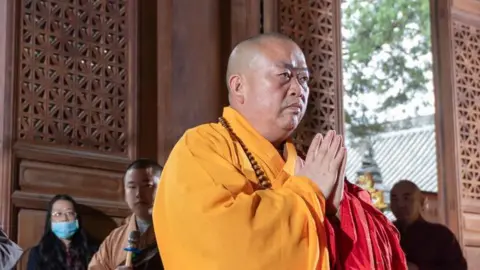Shi Yongxin, the prominent abbot of the centuries-old Shaolin Temple, finds himself embroiled in a multifaceted criminal investigation. As the head monk of this world-renowned institution, located in the scenic mountains of central China’s Henan province, Shi faces serious allegations that include embezzlement and maintaining “improper relationships with multiple women.” Moreover, the claims extend to him purportedly fathering illegitimate children, issues that have prompted scrutiny from several agencies within China.
Established over 1,500 years ago, Shaolin Temple holds a significant place not only in religious circles but also as a lucrative cultural entity, attracting disciples worldwide. Shi Yongxin, who has served as the temple’s abbot since 1999 and has earned the nickname “CEO monk,” played an instrumental role in transforming the temple into a global brand known for its teachings and martial arts, particularly Shaolin Kung Fu. However, allegations questioning his ethics and integrity regarding monetary matters and personal conduct now cast a shadow on this transformation.
In light of the ongoing investigation, the Buddhist Association of China announced on Monday that Shi has been stripped of his ordination certificate. This certificate is a crucial document confirming one’s acceptance into the monastic community, underscoring the gravity of the accusations against him. The association condemned Shi’s actions, stating they are “extremely bad, seriously damaging the reputation of the Buddhist community and the image of monks.” The backlash from the Buddhist community reflects a deep concern about the integrity of monastic life in China and its alignment with the virtues that Buddhism preaches.
The abbot’s notoriety has grown amid previous scandals, including a controversial probe in 2015, where he was accused of engaging in sexual relationships and embezzling temple funds. During that inquiry, he reportedly accepted lavish gifts, including a luxury vehicle and embroidered robes, which further fueled suspicions about his conduct. Although Shi was ultimately cleared of those charges, public cynicism towards his behavior continued to linger.
As news of the current investigation surfaced, the topic gained immense traction on social media, particularly Weibo, where netizens engaged passionately in discussions surrounding the scandal. It appears the mounting allegations have struck a chord with the public, especially given the stark contrast between the temple’s revered status and the accusations levied against its leader. Shi’s last post on his Weibo account, where he had amassed over 880,000 followers and regularly shared Buddhist teachings, was dated July 24, indicating a sudden cessation in his public engagement amidst rising controversy.
Historically, the Shaolin Temple has faced criticism, including a notable backlash in 2015 concerning a proposed plan for a lavish $300 million temple complex that would incorporate commercial elements like hotels and golf courses, prompting concerns over the commodification of spirituality. The temple’s name has entered the global consciousness, featuring in films, music, and video games, symbolizing martial prowess and cultural heritage. Yet, recent events challenge the sanctity of that image and the underlying principles of the institution itself.
In a past interview, Shi downplayed the allegations of wrongdoing, asserting that if any illicit conduct existed, it would have likely already come to light. However, with the latest allegations surfacing, the credibility of his statements is under intense scrutiny. Whether Shi Yongxin will be able to reclaim his position within the Buddhist community or if his legacy will be forever tarnished remains uncertain as investigations unfold, with many watching closely for developments in this ongoing saga.












